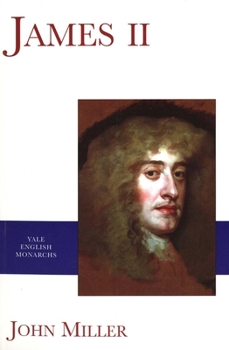Book Overview
James II (1633-1701) lacked the charisma of his father, Charles I, but shared his tendency to dismiss the views of others when they differed from his own. Failing to understand his subjects, James was... This description may be from another edition of this product.
Format:Paperback
Language:English
ISBN:0300087284
ISBN13:9780300087284
Release Date:October 2000
Publisher:Yale University Press
Length:304 Pages
Weight:0.94 lbs.
Dimensions:0.7" x 6.2" x 9.2"
Customer Reviews
1 rating
fair-minded and authoritative account of James' reign
Published by Thriftbooks.com User , 19 years ago
James II has been vilified as representing monarchical absolutism and militant Catholicism almost since the 1688 revolution. How such a tyrant could have been Removed from power by a bloodless coup (in England at any rate) sits somewhat uneasily with the accepted wisdom. Miller paints a more complex picture of James eventful early life - escaping from Cromwell, shadowing his elder brother around Europe. He gives a fair account of James prowess as a naval commander and his organisational and administrative skills in the later years of the reign Charles II. James was torn between his complete loyalty to Charles and his conversion to Catholicism in the 1680's, Charles also showed both exasperation and loyalty towards his rather awkward brother - preferring Monmouth, his natural (though not legitimate) son, but insisting that James be his successor, despite increasingly virulent opposition. James came to view the fact of his succession - despite many travails, false alarms in terms of Charles producing a legitimate heir, and almost hysterical Whig opposition - as a sign of divine favour. Miller also points out that , for most of his reign James accepted that William of Orange - a Protestant married to his Protestant daughter, Mary - would be his successor. This gave impetus to James to improve the plight of his co-religionists and explains his haste to do so. However Parliamentary opposition to an Act of Toleration led James both to use his power to dispense with Parliamentary acts for particular individuals and to attempt to shape Parliamentary support for his proposals. Both acts were interpreted (after the Revolution) as proof of his authoritarianism. His need for a standing army became an even great cause for concern as he began to nominate more Catholic officers. In actual fact Miller shows James as acting in the tradition of the later years of Charles' rule - attempting to influence the selection and election of loyal parliamentarians, and Miller argues that James' view on legislation, dispensing and suspending powers were at least legally arguable. James did overstep the mark by attempting to populate the judiciary with loyalists (or toadies). Miller's view however is that having succeeded in getting the most loyal parliament in 1685, James failed to recognize the limits of his parliamentary support. Having failed to win parliament to toleration, he believed he could again reshape parliament to elect people more amenable to toleration. In this he was, to say the least, poorly advised; and this effort, combined with its consequent attack on the Church of England, led to the fall off in support which led to the invitation to William of Orange to come and help sort out the situation. Once William landed - undeterred by French threats, the English Navy and Winter weather - James' belief in Providence seems to have collapsed and he viewed the subsequent desertions by his family and officers as a Divine punishment for past sins. H






